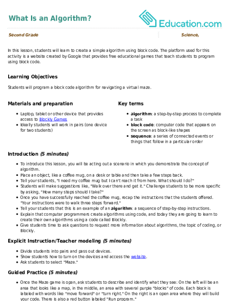2nd Grade Computer Science Lesson Plans
About 2nd Grade Computer Science Lesson Plans
On Education.com, 2nd grade computer science lesson plans introduce young learners to fundamental concepts like algorithms, sequences, and basic programming. These lessons help students develop problem-solving, critical thinking, and computational skills while exploring engaging and age-appropriate activities. The page provides structured resources and classroom-ready guides that support teachers and parents in creating meaningful technology education experiences.
Through a variety of digital activities, printable worksheets, and interactive projects, 2nd grade computer science lesson plans on Education.com offer hands-on learning opportunities. The resources encourage creativity and exploration as students learn to give clear instructions, recognize patterns, and understand computer behavior. This collection makes integrating technology into the classroom or home setting easy and accessible.
Educators and parents can use these structured materials to reinforce classroom lessons or create independent learning experiences. The resources save time by providing ready-to-use worksheets and project ideas that foster skills industry graduate. With a focus on beginning coding and computational thinking, students gain confidence while having fun with technology.
Through a variety of digital activities, printable worksheets, and interactive projects, 2nd grade computer science lesson plans on Education.com offer hands-on learning opportunities. The resources encourage creativity and exploration as students learn to give clear instructions, recognize patterns, and understand computer behavior. This collection makes integrating technology into the classroom or home setting easy and accessible.
Educators and parents can use these structured materials to reinforce classroom lessons or create independent learning experiences. The resources save time by providing ready-to-use worksheets and project ideas that foster skills industry graduate. With a focus on beginning coding and computational thinking, students gain confidence while having fun with technology.

